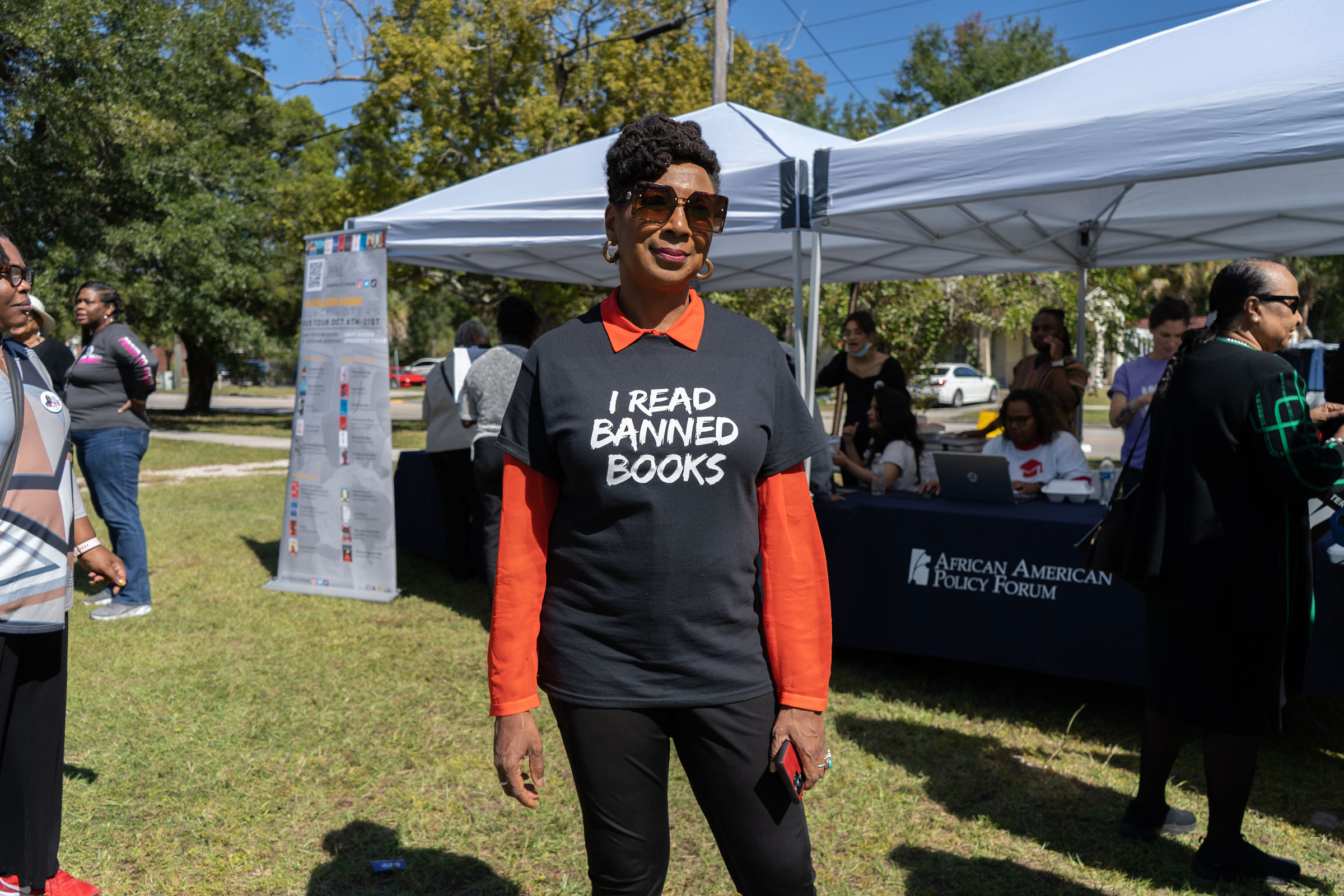
The buses are hard to miss. One is unusually elegant for a bus—deep, shiny black with deeper black windows and a cognac leather interior. One is wrapped in the logo of the Transformative Justice Coalition, a group that, as anyone who saw the bus now knows, is trying to register 10 million Black voters. The third is covered in images of protesters and the phrase Black Voters Matter, the name of a political organization credited with helping to flip neighboring Georgia from red to blue.
When they’d set out from Minneapolis earlier in October, their cargo holds contained about 6,000 copies of commonly banned books. All Boys Aren’t Blue; The Bluest Eye; Their Eyes Were Watching God. Some were award-winning classics, some the literary equivalent of top-40 hits— both categories a testament to how zealous the drive to stop certain ideas has become.
Also aboard the caravan: Kimberlé Crenshaw, a professor at Columbia University and the University of California Los Angeles law schools, who of late may be best known for her role in the development of critical race theory—actual critical race theory, a decades-old form of high-level legal analysis used to illuminate the ways racism continues to shape American public policy. That’s quite different from the political avatar known as “critical race theory” (CRT), a catchall for a mode of thinking that, its critics argue, aims to blame and shame those who have been the beneficiaries of racial oppression.
Crenshaw is at once in the running for top social villain of 2022, at least for a certain kind of conservative thinker, and a face few outside of academia and activist circles would recognize. Having also worked with Anita Hill’s legal team during Clarence Thomas’ confirmation hearings, coined the term “intersectionality,” and been involved in the #SayHerName movement, she is one of the most influential scholars in her field. But here in Jacksonville, she’s unassuming, in oversized sunglasses and an I READ BANNED BOOKS t-shirt.
“The experience of being rebranded from the vantage point of somebody or some collective group of people who are not about the truth, not remotely interested in democracy or racial justice—it is sobering, to say the least,” says Crenshaw, who had been on that bus for 22 days when she disembarked last Friday in Jacksonville, Fla. “Thirty years of a project can be erased by disinformation and disinterest in correcting that disinformation.”
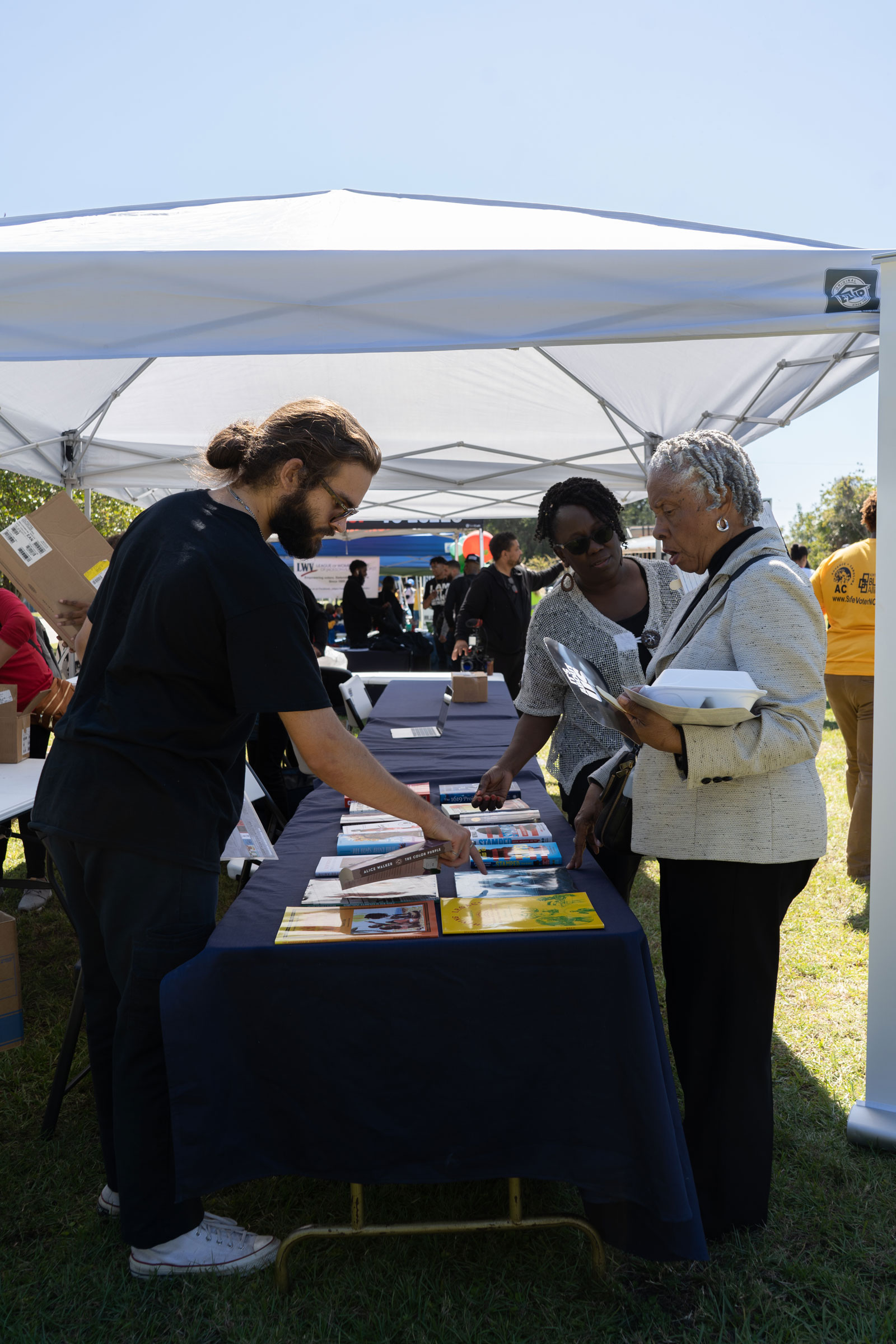
The organizers at of this “Books Unbanned” tour—the Transformative Justice Coalition, Black Voters Matter, and the African American Policy Forum, a liberal social-justice think tank—took it to the American road in the weeks before the approaching midterm elections with the goal of making real the relationship between censorship and what they say is a looming threat to democracy. They did so in a way that to some, aware of how the Overton Window has shifted in American politics, may seem quaint: giving away books and registering voters.
But their route was layered with meaning. From Minneapolis to Milwaukee and Kenosha, Wisc. From Chicago to Ypsilanti and Detroit, Mich., before swinging through Crenshaw’s heartland hometown of Toledo, Ohio, and then on to Cleveland and Pittsburgh and Baltimore, before a stop in Washington, D.C. Then came a few stops in Northern Virginia, in Richmond, and in Raleigh, before moving onto eastern North Carolina and then destinations further south.
And Jacksonville, Fla., was the last stop for a reason.
In January, Duval County Public Schools, which serve Jacksonville, effectively removed 176 books from student access in schools placing them, in the district’s preferred parlance, “under review” until an unspecified date. That makes Duval County, per anti-censorship nonprofit PEN America, the country’s book-banningest community.
This is a city where at least one teacher who operated a leadership organization at one of the city’s overwhelmingly Black high schools was fired after, she says, hanging a Black Lives Matter banner in her classroom and refusing to take it down. (The teacher, a white woman, sued but has since settled the case for $300,000; a school board member said at the time that the district hadn’t done anything wrong.) And it was in Jacksonville that a federal lawsuit failed in its attempt to block the state’s “Stop WOKE Act,” a law limiting many forms of diversity and inclusion initiatives championed by Florida’s politically ambitious Republican Governor Ron DeSantis.
Crenshaw sees what’s happening in Florida—and so many places around the country—as cause for a contemporary caution along the lines of the Rev. Martin Niemöller’s famous warning: “They first came for critical race theory,” she told me on the banned-book bus, “and basically no one did anything.”
A common progressive rebuttal to the CRT controversy and related book bans is to point out that CRT is not even taught at the K-12 level. To Crenshaw, this amounts to a capitulation that fails to defend the need for real critical race theory—and a revelation that her supposed allies are, at best, exhausted, at worst nursing their own deep discomforts and resentments about what a more inclusive country would mean.
“Once that horse got out of the barn, which it did, it picked up a whole lot of other issues,” she says. “It went from basically ‘don’t say race or racism,’ to ‘don’t say gay,’ and now trans, and eventually it will take on others.”
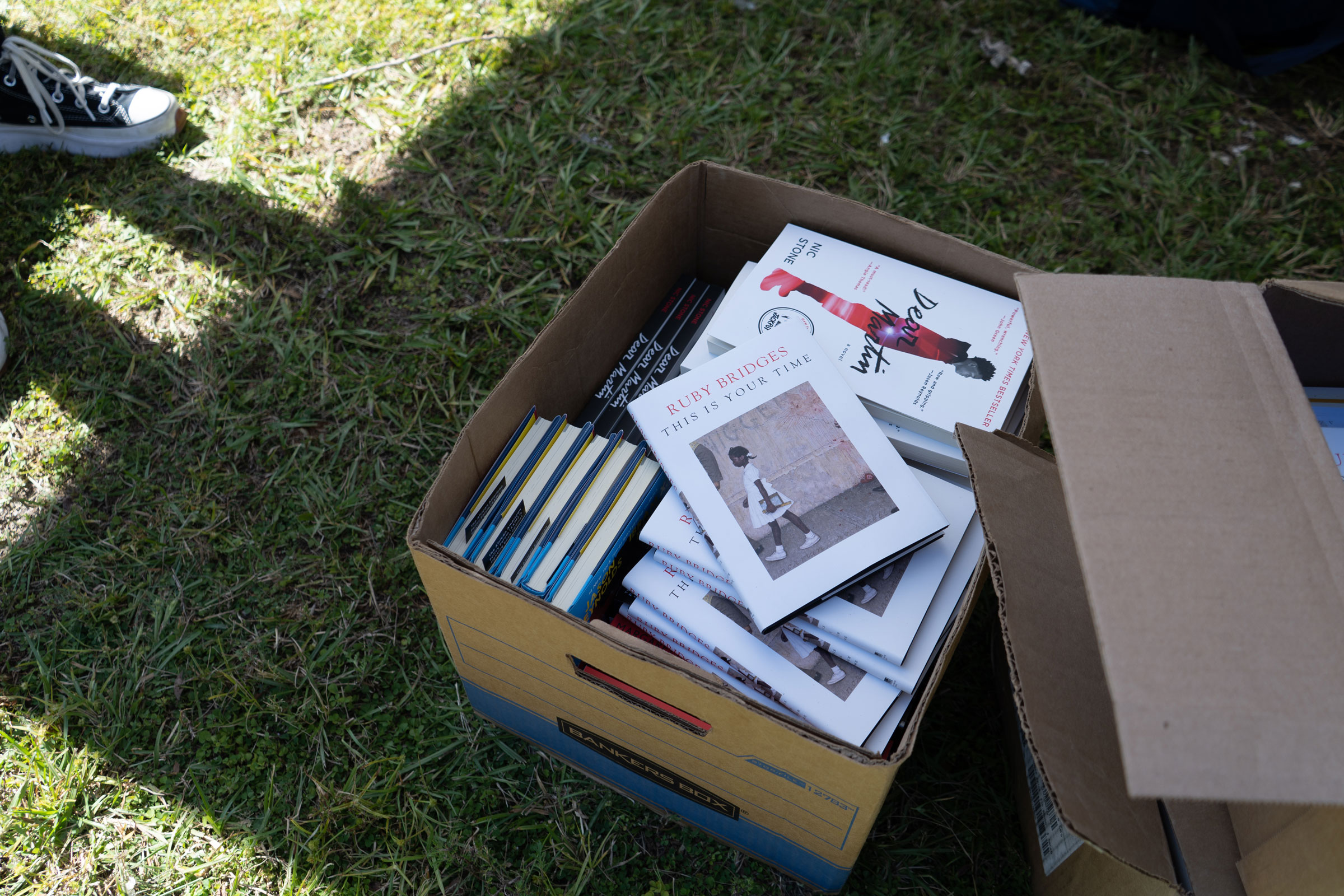
Parent complaints about books have long been a part of American life. Waves of concern have come and gone, ranging from communism to witchcraft. In more recent years, the focus has been on CRT—and Christopher Rufo, the conservative thinker whom many credit as the mastermind behind that trend, told the New York Times in April that he sees even greater incendiary potential in what he calls “gender ideology.” But, say experts, this time what’s different goes beyond the subject matter.
“This is a growing movement, with a consistent playbook, where there are lists of books circulating online to be targeted,” says Jonathan Friedman, director of free expression and education programs at PEN America. “Then pressure is placed through emails or theatrical readings at school board meetings. Pressure is placed on district leaders or principals to remove books immediately.”
That pressure has, in more than one city, included a mass of organized parents who show up at school board meetings ready to fight. Some public libraries have opened their return drops to find books riddled with bullet holes, seen children’s story hours disrupted, and librarians doxxed and harrassed, says Deborah Caldwell-Stone, director of the Office for Intellectual Freedom at the American Library Association (ALA). Messaging developed by conservative think tanks and political organizations has helped parent groups mount organized campaigns, she says.
To their opponents, the link between individual challenges to books and the large-scale effort to control the spread of so-called CRT, particularly in schools, is clear. These regulations, to them, are not simply ugly wounds to the principle of free speech. They are the warning signs of a democracy in crisis, one that could come undone.
“Really what we are seeing is an effort to silence the voices of marginalized groups in our society,” says Caldwell-Stone.
Read more: Culture Wars Could Be Coming to a School Board Near You
In a typical year, the ALA’s members report that about 500 separate titles have been “challenged.” Last year, challenges were reported to the association about 1,597 individual titles. PEN America has documented 2,535 episodes of books being challenged in schools between July 2021 and June 2022. Anti-“CRT” policies have already been passed in at least 36 states. The fight over curricula has been credited with the election of Virginia’s next governor, Republican Glenn Youngkin. Now, in the run-up to next months’ midterm elections, the topic remains a potentially decisive—and, for some, motivating—issue in several races.
“This is the biggest assault on freedom of expression, freedom of thought, freedom of teaching since the 1950s, since the McCarthy period,” says Harvard Law School professor Randall Kennedy, a well-known champion of free expression, who has also in the past voiced disagreement with some of Crenshaw’s ideas. “If you prize freedom of thought then you should be up in arms given what is happening.”
But on that Friday morning, when the Books Unbanned Tour rolls into town, what happens at a neatly trimmed field adjacent to a historic Black church in Jacksonville feels like a small community festival for people who aren’t allergic to thinking. The only evidence to the contrary: the security guards moving throughout the crowd, one of whom stays close to Crenshaw at almost all times.
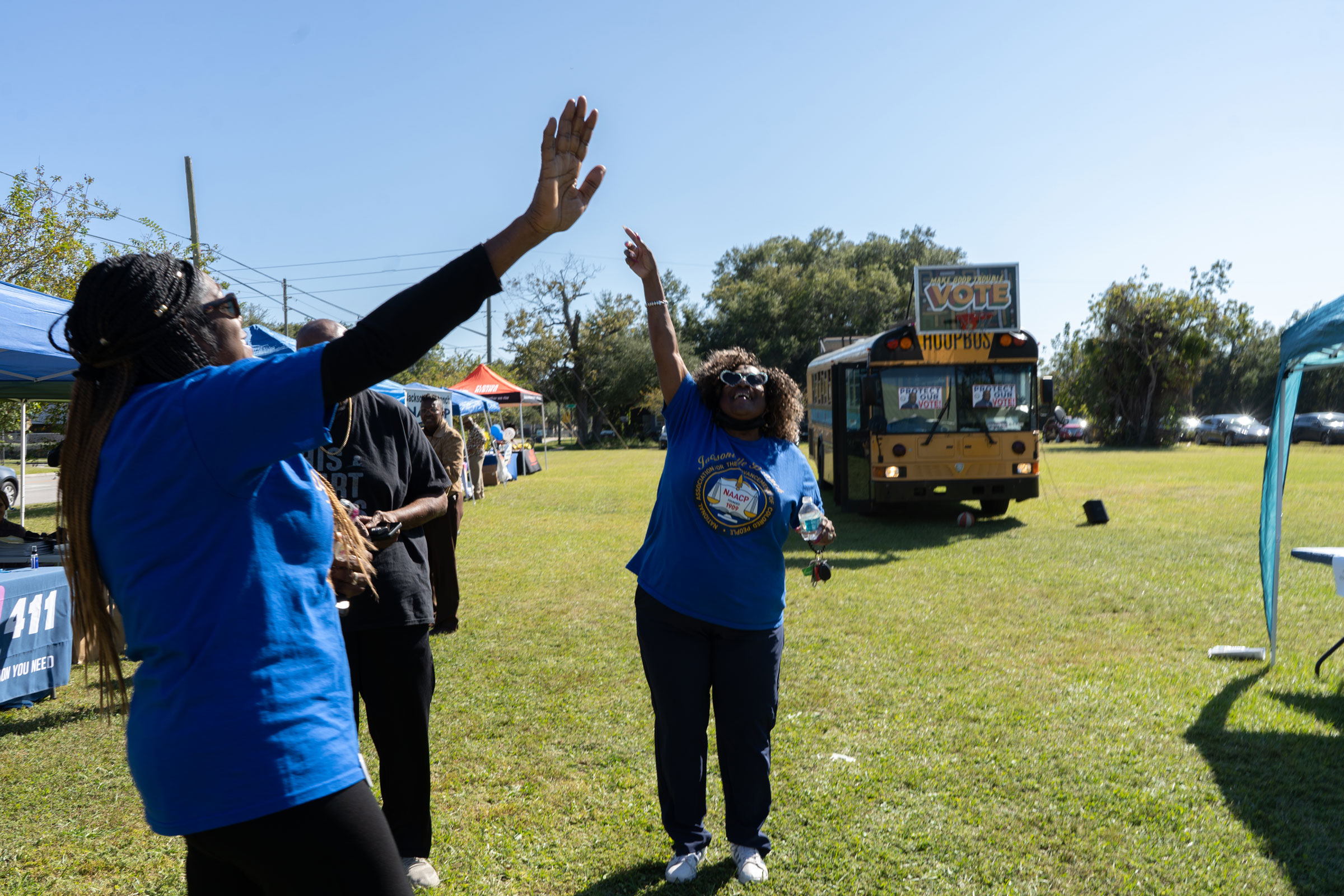
The social and political influence of the anti-CRT campaign has been so complete, she says, that even giving her the space to write about her own ideas or—as she and other organizers discovered when arranging the bus tour—to appear at public events has come to mean taking a radically partisan stance. That’s how the publishers of some of the banned titles explained their decision not to be affiliated with a tour distributing their own books, Crenshaw says. She says the same goes for some of the nation’s leading pro-democracy and anti-censorship organizations.
“It’s been really surprising,” she says. “The usual defenders of free speech are suspiciously quiet when it comes to critical race theory.”
Crenshaw has been dismayed by the way that her more than 30 years of writing and public speaking about what is required to operate a functional multi-racial democracy has been so easily and swiftly shouted down by the anti-CRT craze.
But while she’s sobered by the experience, she’s not necessarily surprised.
“Frankly, the Achilles heel of American democracy is white supremacy,” Crenshaw says when we spoke by phone before the Jacksonville event. “It is racism. You can do things when it’s framed as a race matter that you could otherwise never do. Try saying we are going to ban all ideas, all lessons, all books about evolution. There is this way that when it’s done against Black people, you can do anything. It’s not seen as a crisis. It grows on the backs of ambivalence about anti-racism.”
We have been here before, says Kennedy, the Harvard Law professor. Prior to the Civil War, many states outlawed Black literacy, and the distribution of anti-slavery literature was made a capital crime.
“This is not coming out of the blue. This itself is part of a baleful American tradition,” he says. “We’ve heard it before. We’re simply going to have to meet it like people in the past have met it before.”
And, as is so often the case, the impact of this culture war is not distributed evenly. While much of the public conversation about the alleged harms of increased classroom attention paid to racial oppression has focused on the idea that white children will suffer psychic damage from guilt, the harm to Black children is one about which we don’t have to speculate, Crenshaw says.
In the absence of ready information about American history, the reality that Black Americans do disproportionately fall into the disadvantaged terrain of many measures of social and economic well-being may seem to be merely the net result of individual failings, she explains. Not only does that render moot movements and policy changes, it weights the issue with self-hate: If America has always been a free and egalitarian land of opportunity, what is wrong with my people? What is wrong with me?
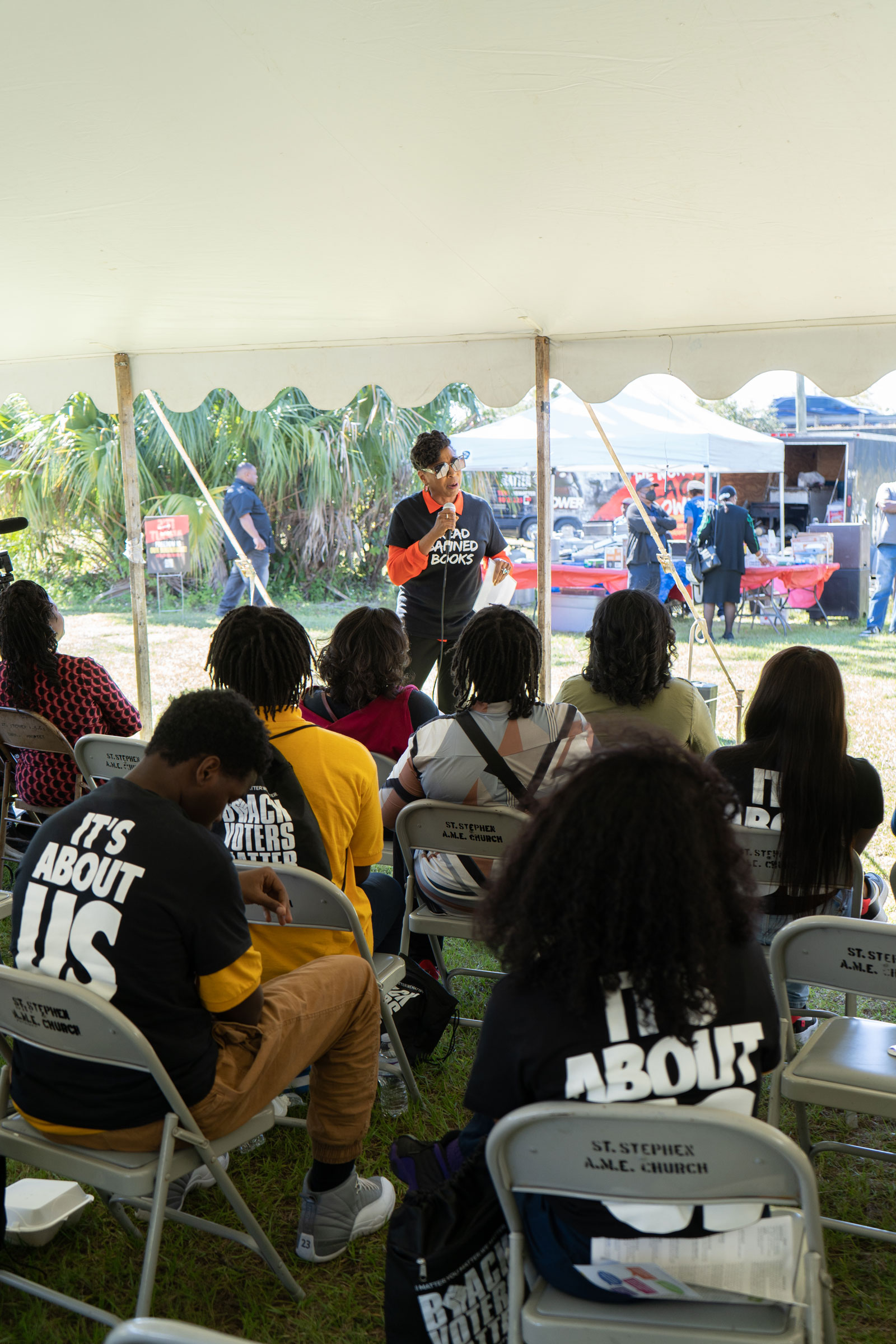
The children who might ask that question are clearly on Crenshaw’s mind when she comes to the microphone in Jacksonville.
“You’ve heard about gerrymandering our vote, gerrymandering our districts,” Crenshaw says to the roughly 100 people gathered there. “What I want to talk about,” she says, “is how they gerrymander our history—and how gerrymandering our history is what they are using to undermine our ability to link our present to the past.”
The breaking of the link between the present and the past, she goes on to say, keeps people from understanding their own lives. How do we talk about the racial wealth gap, for example, if we can’t connect it to the story of slavery?
“Let me get real with what they don’t want us to know,” Crenshaw says to the crowd. ”This country was built on the idea that this was white country and that Black people didn’t have a part in it. ….We know to try to change that we have to know it. They don’t want us to know it. They don’t want us to be empowered by the fact that we have survived this thing. We have thrived in this thing and we are the ones who have actually saved our democracy.”
When the event was over, the banned book tour crew heads for the buses. There are empty and half-full book boxes to break down and containers of Good Trouble pins, bookmarks bearing the event’s Freedom Riders to Freedom Readers tagline, and COVID-19 tests to tally. There are books to relocate into a U-Haul truck parked nearby. What’s left will be distributed through a banned books reading club Crenshaw and others on the tour are planning.
So, beside the open cargo holds, Crenshaw gets back to work.
More Must-Reads from TIME
- Donald Trump Is TIME's 2024 Person of the Year
- Why We Chose Trump as Person of the Year
- Is Intermittent Fasting Good or Bad for You?
- The 100 Must-Read Books of 2024
- The 20 Best Christmas TV Episodes
- Column: If Optimism Feels Ridiculous Now, Try Hope
- The Future of Climate Action Is Trade Policy
- Merle Bombardieri Is Helping People Make the Baby Decision
Contact us at letters@time.com